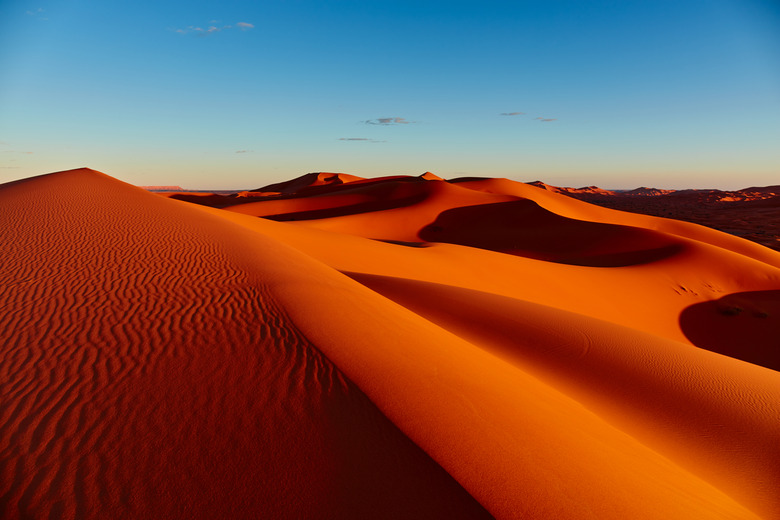Famous Hot Deserts
Deserts comprise a fifth of the Earth's land surface, and are located on every continent. Biosphere activity in hot deserts are the lowest compared with other climatic regions, because the lack of water and extremes of temperature inhibit plant and animal activity. Plants such as cacti can adapt to this region, but cannot grow as quickly as other vegetation which have continuous supplies of water. Deserts harbor animals such as reptiles, birds and insects, and have an ecosystem adapted to a life of environmental extremes. Reptiles in particular are well-suited to a desert existence because of their ability to conserve water more efficiently than species such as mammals.
Sahara
Sahara
The Sahara is the largest hot desert on the planet, with an area of 3.5 million square miles. Temperatures can reach 122 degrees Fahrenheit in the day. The geography of the Sahara consist of mountains, salt flats, rocky terrain and large regions of sand dunes. The interior of the Sahara receives less than 1.5 cm of rain per year. However, plant species such as acacia trees and grasses can exist in this desert. Animals of the Sahara include the addax antelope, the fennec fox, jackals and the spiny-tailed lizard. The total population of humans is less than 2 million.
Kalahari
Kalahari
The Kalahari is in Southwestern Africa, and covers an area of 200,000 square miles. San Bushmen have lived in this area for 20,000 years. Grasses, shrub and several varieties of tree are among the vegetation found in the Kalahari. While much of the Kalahari is hot and dry, there are parts of it which do receive more rainfall. Temperatures can range from between 89 to 107 degrees Fahrenheit. Gazelle, hyena and jackals can be found along with birds such as sandgrouse.
Mojave
Mojave
The Mojave desert is in the Southwestern United States, covering parts of California, Nevada and Arizona. It is known as a "high" desert because it lies at an altitude of 2,000 to 5,000 feet. Rainfall varies between 2.23 to 2.5 inches a year. Desert scrub such as brittlebush, Joshua tree, and sagebrush are the dominant vegetation. The Mojave is famous for the Kelso Dunes, which can reach 500 feet in height. The desert tortoise has adapted to life in the Mojave, along with other animals such as bighorn sheep, coyote, jackrabbit and the zebra-tailed lizard.
The Great Victoria
The Great Victoria
The largest desert in Australia, the Great Victoria covers almost 164,000 square miles. The annual rainfall fluctuates year to year from between 6 to 10 inches. Temperatures reach between 90 and 95 degrees Fahrenheit during the summers. Woodlands populated by eucalyptus trees are plentiful, interspersed with various grasses, shrub lands and "gibber" plains, which consist of pebbles mixed with oxide soils. The Great Victoria is biodiverse, with many reptile species populating it. Mammals can also be found, such as the marsupial mole, the bandicoot and the dingo.
Cite This Article
MLA
Conceicao, Peter De. "Famous Hot Deserts" sciencing.com, https://www.sciencing.com/famous-hot-deserts-6936470/. 22 November 2019.
APA
Conceicao, Peter De. (2019, November 22). Famous Hot Deserts. sciencing.com. Retrieved from https://www.sciencing.com/famous-hot-deserts-6936470/
Chicago
Conceicao, Peter De. Famous Hot Deserts last modified March 24, 2022. https://www.sciencing.com/famous-hot-deserts-6936470/
